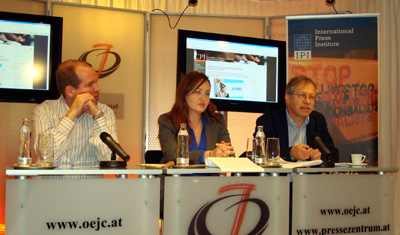Kazakhstan is ready to bring its press laws in line with international standards, a top diplomat told a CPJ delegation in Vienna this week. Decriminalizing libel, placing caps on defamation awards, and enacting access-to-information legislation are on the government’s agenda, said Kazakhstan Ambassador Kairat Abdrakhmanov, who is chairman of the permanent council of the Organization for Security and Co-operation in Europe.
Abdrakhmanov made the comments during a two-hour meeting on Monday with Jean-Paul Marthoz, CPJ’s Brussels-based senior advisor, and me. The meeting followed a highly critical CPJ special report, issued in September, that detailed Kazakhstan’s poor press freedom record and its failure to deliver the media reforms it had promised in exchange for gaining this year’s OSCE chairmanship.
We also presented our special report, “Disdaining Press Freedom, Kazakhstan Undermined OSCE,” to journalists, diplomats, NGO representatives, and scholars at a briefing Tuesday, co-sponsored by the Vienna-based International Press Institute and held at the Austrian Journalists Club. Marthoz and I spoke about Kazakhstan’s ongoing failure to meet it press freedom commitments not only as a leader of the OSCE but as a member. Anthony Mills, IPI’s press freedom coordinator, moderated the discussion.
Ten months into its OSCE chairmanship, Kazakhstan holds at least one journalist and one human rights defender behind bars in retaliation for their work; it has implemented new laws restricting Internet freedom and the coverage of public officials; it has obstructed a pro-opposition weekly; and it has forced the closure of at least two independent newspapers. Marthoz spoke about European Union relations with Kazakhstan and the interest expressed by EU members in examining Kazakhstan’s press freedom record.
We are urging OSCE nations to address Kazakhstan’s press freedom record at the organization’s summit, scheduled for December in Astana; we’re asking them to seek meaningful reforms from Kazakhstan that can be guided by clear benchmarks. In July, in announcing the OSCE summit, Kazakhstan Foreign Minister Kanat Saudabayev outlined an agenda that focused on security without any mention of human rights or press freedom. During our meeting Monday, Abdrakhmanov would not commit to including Kazakhstan’s press freedom record on the summit agenda, saying the decision requires a consensus among the 56 OSCE states. He said press freedom would be the focus of a number of scheduled events to be held in parallel to the summit.
While telling our delegation that Kazakhstan “has a problem with its media legislation,” Abdrakhmanov would not commit to a specific timeframe for enacting press freedom reforms. Given that Kazakhstan reneged on reform promises made back in 2007, when it was seeking the OSCE chairmanship, there is plenty of reason to watch its actions closely now.
